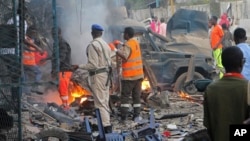The Somali government has appointed new security chiefs, nearly four months after firing the previous commanders after a series of deadly al-Shabab attacks. But experts warn that the new security chiefs are not "miracle" workers and need support from the public and their own government to win the war against the militants.
During a special meeting in Mogadishu on Monday, the Cabinet approved the appointment of Hussein Osman Hussein to become director of the National Intelligence and Security Agency (NISA) and General Bashir Abdi Mohamed to be the commissioner of the police.
Also appointed was Major General Bashir Mohamed Jama, known as "Gobe," who returns as commander of the prison guards, a position he lost less than a year ago.
New blood, old blood
Hussein, who currently serves as the deputy minister of health, has been a long time member of the parliament and previously held the position of deputy security minister. He will lead a small agency with about 4,500 personnel, half of whom are plain-clothed officers.
General Mohamed is a career police officer who held various positions within the department, including chief of police engineers, commander of training department and head of the central investigations department. He joined the police in 1971.
Last year, Somali leaders agreed to create a police force of about 32,000 nationwide. The current force is about half that size.
Hussein and Mohamed's predecessors — Abdullahi Mohamed Ali Sanbalolshe of NISA, and General Abdihakim Dahir Saaid of the police — were fired on October 29 last year, a day after an al-Shabab attack on a Mogadishu hotel left nearly 30 people dead. Two weeks earlier, a massive truck bomb in the capital killed 512, making it the largest terrorist attack in African history.
State minister for the office of the prime minister, Abdullahi Hamud, defended the long process it took to appoint new commanders.
"It was just a matter of caution and for the government to pick the right person who can fit in the job, it wasn't because of other things," he said.
Former NISA director General Abdirahman Mohamed Turyare said the new commanders have a chance to do well if they learn from "mistakes" made by predecessors.
"They can look back on mistakes made so as to avoid them, and bring on board ideas that worked," he said.
Turyare urged the commanders not to confine operations to Mogadishu but to spread the war against al-Shabab beyond the capital, take care of their agencies' personnel and make sure they get better technology.
He cautioned that the new commanders could probably not solve security failures immediately.
"They bring experience, work ethic and dedication but they are not miracle people," he said.
There have been no major al-Shabab attacks in Mogadishu in almost four months, since the firing of the previous commanders back in late October. The new commanders will hope to continue that streak.
Abdulkadir Mohamed Abdulle contributed to the report from Mogadishu.




